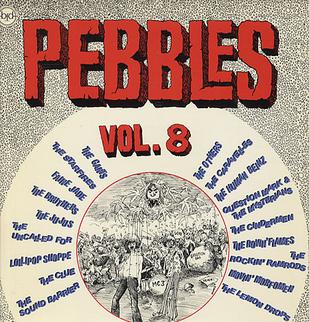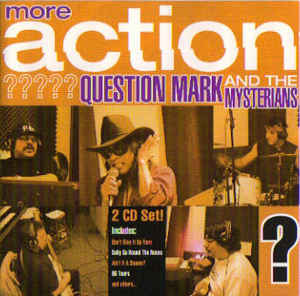? and the Mysterians are an American garage rock band from Bay City and Saginaw in Michigan, initially active between 1962 and 1969. Much of the band's music consisted of electric organ-driven garage rock and an enigmatic image inspired by the 1957 Japanese science fiction film The Mysterians. In addition, the band's sound was also marked by the raw, resonating lead vocals of "?", making Question Mark and the Mysterians one of the earliest groups whose musical style is described as punk rock. Their music and imagery were highly influential on later bands.

96 Tears is the debut studio album by the American garage rock band? and the Mysterians, released in 1966. It peaked at number 66 on Billboard's Pop Albums chart. The single "96 Tears" reached number 1 on the Billboard Hot 100 on October 29, prior to release of the album. The album and the single "96 Tears" were both on the charts for fifteen weeks, while the single "I Need Somebody" was on the charts for ten weeks.

"96 Tears" is a song recorded by the American garage rock band? and the Mysterians in 1966. In October of that year, it was #1 on the Billboard Hot 100 in the U.S. and on the RPM 100 in Canada. Billboard ranked the record as the #5 song for 1966. It was ranked #213 on the Rolling Stone list of the 500 Greatest Songs of All Time in 2010. On November 11, 1966, the single was certified as gold by the RIAA.

Tracy Lee Lawrence is an American country music singer, songwriter, and record producer. Born in Atlanta, Texas, and raised in Foreman, Arkansas, Lawrence began performing at age 15 and moved to Nashville, Tennessee, in 1990 to begin his country music career. He signed to Atlantic Records Nashville in 1991 and made his debut late that year with the album Sticks and Stones. Five more studio albums, as well as a live album and a compilation album, followed throughout the 1990s and into 2000 on Atlantic before the label's country division was closed in 2001. Afterward, he recorded for Warner Bros. Records, DreamWorks Records, Mercury Records Nashville, and his own labels, Rocky Comfort Records and Lawrence Music Group.
Cameo-Parkway Records was the parent company of Cameo Records and Parkway Records, which were major American Philadelphia-based record labels from 1956 and 1958 to 1967. Among the types of music released were doo-wop, dance hits, popular/rock, rockabilly, big band, garage rock, soul and novelty records.

ABKCO Music & Records, Inc. is an American independent record label, music publisher, and film and video production company. It owns and/or administers the rights to music by Sam Cooke, the Rolling Stones, the Animals, Herman's Hermits, Marianne Faithfull, Dishwalla, the Kinks as well as the Cameo Parkway label, which includes recordings by such artists as Chubby Checker, Bobby Rydell, the Orlons, the Dovells, Question Mark & the Mysterians, the Tymes and Dee Dee Sharp. Until 2009, ABKCO administered Philles Records and its master recordings, including hits by the Righteous Brothers, the Ronettes, the Crystals and others. The label is infamous for its management contracts and lawsuits by its founder Allen Klein, the latter of which persisted until his death.

The Lawrence Arms are an American punk rock band from Chicago, formed in 1999. They have released seven full-length albums and toured extensively.

The Outsiders were an American rock and roll band from Cleveland, Ohio, that was founded and led by guitarist Tom King. The band released the hit single "Time Won't Let Me" in early 1966, which peaked at No. 5 in the US in April. The band had three other Hot 100 top 40 hit singles in 1966, but none on the Hot 100 afterwards, and released a total of four albums in the mid-1960s.
Terry Knight and the Pack was an American garage rock band formed in Flint, Michigan in 1965. The band was signed to the Lucky Eleven label through most of its brief recording career. They produced one national hit with their cover version of the song, "I ". Despite their inability to replicate their success, the band was a frequent attraction in the Michigan rock scene. The Pack was fronted by singer Terry Knight. In 1969 the group disbanded but two members, drummer/vocalist Don Brewer and guitarist Mark Farner, would go on to form another band, Grand Funk Railroad.
The Deep was an American psychedelic rock band made up of musicians from New York City, who in 1966 traveled to Philadelphia to record a one-time LP, Psychedelic Moods. The band was experimentally progressive, as they were one of the earliest groups to record psychedelic music, before it was adapted by a wider array of musical acts. Although their only album failed to achieve success, it later gained acclaim for being considered the earliest work to reference "psychedelic" in its title.

Pebbles, Volume 8 is a compilation album among the LPs in the Pebbles series. The music on this album has no relation to Pebbles, Volume 8 that was released on CD many years later.
The Rationals were an American rock band from Ann Arbor, Michigan.

The discography of All, an American punk rock band, consists of nine studio albums, one compilation album, two live albums, one EP, six singles, and five music videos.

Action is the second album by the American garage rock band? and the Mysterians, released in 1967.

We the People was an American garage rock band from Orlando, Florida, that was formed in late 1965 and professionally active between 1966 and 1970. Although none of their singles charted nationally in the U.S., a number of them did reach the Top 10 of the local Orlando charts. The band are perhaps best remembered for their song "Mirror of Your Mind", which reached the Top 10 in a number of regional singles charts across the U.S. during 1966. The song has subsequently been included on several compilation albums over the years.
"Do Something to Me" is a song written by Jimmy Calvert, Norman Marzano, and Paul Naumann and was recorded by Tommy James and the Shondells for their 1968 album, Crimson & Clover.

Psychedelic Moods is the debut album by the American psychedelic rock band, The Deep, and was released on Cameo-Parkway Records in October 1966. The album was one of the first pieces to produce a consistent psychedelic theme throughout the whole LP. All of the material featured was originally composed by the band. Despite the conflicting dates, it is sometimes considered the first album to use the term "psychedelic" in its title.

More Action is the fourth studio album by the American garage rock band? and the Mysterians, and was released on May 25, 1999, on Cavestomp Records. The album provides a summary of the band's initial tenure in the 1960s, and also functions as a survey of the group's re-recordings of their recording history between 1966 and 1969, along with new material.

(Turn On) The Music Machine is the debut studio album by the American garage rock band The Music Machine, released on Original Sound Records on December 31, 1966. It arrived just months after the group's hit single, "Talk Talk", propelled to number 15 on the national charts. Although the album was hastily recorded to capitalize on the Music Machine's popularity, (Turn On) The Music Machine became a moderate hit on the Billboard Top LPs chart, and is hailed today as a classic garage rock album. Another single, "The People in Me" was also released in support of the album.

"Get Yourself Together" is a song by British rock band Small Faces, first released in 1967. It was cut during their tenure on both Decca and Immediate Records in 1966 and 1967 and was written by the Marriott/Lane partnership, who wrote a majority of the Small Faces material. It is regarded as one of their best compositions. It remains one of their most popular efforts despite it not being released as single in the United Kingdom or the United States and has since been covered by other influential artists.














